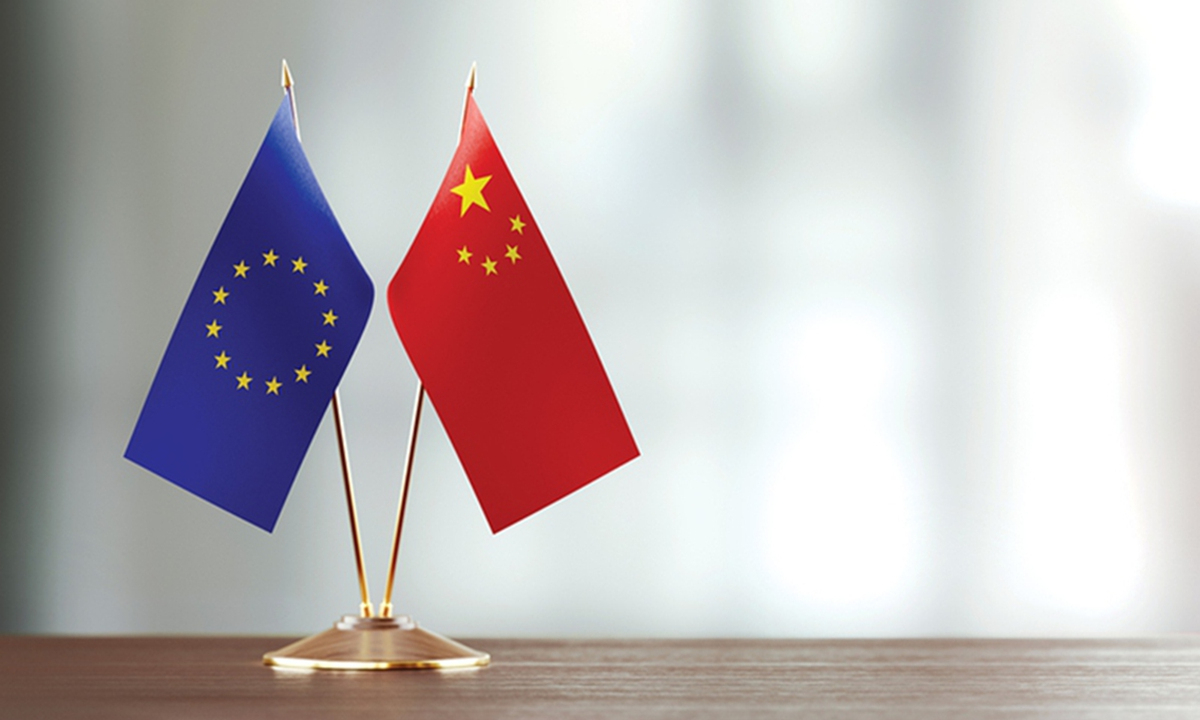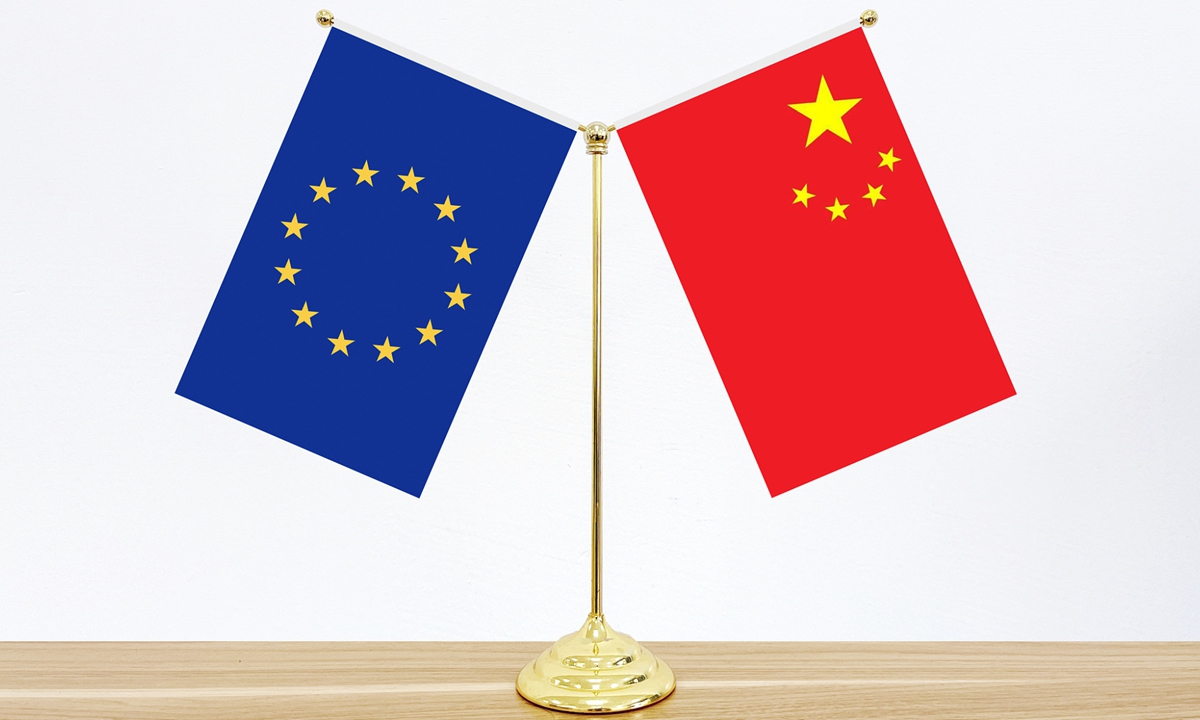
China EU Photo: VCG
It is in the fundamental interest of both sides if China-EU relations can stabilize and improve, which requires both sides to explore aspects of cooperation, manage divergences and promote exchanges, Chinese experts said on Tuesday, ahead of the China-EU summit to be held in Beijing, the first face-to-face China-EU summit in the post-COVID period.
The 23rd China-EU Summit was held two months after the Russia-Ukraine military conflict broke out, while 24th edition follows the China-US summit meeting in mid-November, a face-to-face meeting that has stabilized China-US ties to some extent.
Against the backdrop of regional conflicts and a global economic downturn, with increasingly more Global South countries showing a tendency toward diplomatic autonomy, Europe should not miss the opportunity to strengthen cooperation with China and make choices that are in line with its own strategic interests, analysts said.
During a Monday meeting with diplomats from the Delegation of the EU to China and from EU member states, Chinese Foreign Minister Wang Yi said that 2023 marks the 20th anniversary of the establishment of the China-EU Comprehensive Strategic Partnership, an important year for carrying forward the past and starting the future.
According to the top Chinese diplomat, leaders from China and the EU leaders from the two sides will have in-depth exchange of strategic and global issues concerning China-EU relations on the upcoming 24th China-EU Summit, and will show the direction and draw a blueprint for, and boost confidence and inject impetus in the bilateral relations.. The two sides should make joint efforts to ensure the success of the summit and push China-EU relations to a new level with new prospects.
If China and Europe choose dialogue and cooperation, camp confrontation will not form; if China and Europe choose peace and stability, a new Cold War will not be ignited; if China and Europe choose openness and win-win cooperation, there will be hope for global development and prosperity, Wang said.
Window for improving ties
The 24th China-EU Summit will be held in Beijing on December 7, and Chinese President Xi Jinping is set to meet with President of the European Council Charles Michel and President of the European Commission Ursula von der Leyen, Chinese Foreign Ministry spokesperson Hua Chunying announced on Monday.
China and the EU resumed high-level exchanges in the post-COVID period since the end of 2022 and maintained the momentum of engagement as leaders and officials from countries including Germany, France and Spain as well as from the European Council and the European Commission visited China over the year. Chinese Premier Li Qiang also visited Germany and France in June.
Meanwhile, China-EU high-level dialogues in the fields of environment and climate, digital, economy, trade and strategy have been held successfully, and consultations in various fields have been advanced.
"After the San Francisco summit meeting that promoted a détente between China and the US, the China-EU summit, symbolizing the full restoration of the China-EU communication mechanism, will be an opportunity for China-EU relations to rebound and maintain a stabilizing momentum," Sun Keqin, a research fellow at the China Institutes of Contemporary International Relations, told the Global Times on Tuesday
Cui Hongjian, a professor with the Academy of Regional and Global Governance at Beijing Foreign Studies University, believes the summit is also about how the two sides can further forge a consensus on cooperation and hotspot issues, and address how China-EU relations can move further forward after stabilizing.
How the two sides can more effectively manage differences and how to turn some of the competitive factors into a driving force for cooperation are also issues that the two sides need to explore in depth, Cui said.
The international community has increasingly questioned the political judgment and economic capacity of Western societies in the past few years, and the countries of the Global South have increasingly demonstrated a tendency toward diplomatic autonomy. The EU needs a new response to these new trends, said Sun Peisong, a research fellow at the Institute of World Development Studies, Development Research Center of the State Council.
Europe, facing challenges of recession and inflation, should not miss this opportunity to strengthen cooperation with China, Sun said.
Only openness and cooperation are policy direction worth pursuing in Europe's fundamental interests, Cui said.
Divergences not insurmountable
However, experts also said that despite the overall positive tone, one should not expect too much from the summit, as Europe still has a negative perception of China, in terms of its political system, ideology and even economy.
Some European media said it remains unclear whether both sides will be able to issue a joint statement following the talks.
Former NATO secretary-general Anders Fogh Rasmussen wrote in an article published in the Financial Times on Monday that it "would be a mistake" if EU leaders focus on economic cooperation with Beijing. He also called on EU leaders to "stand up for Taiwan" during the summit.
The European side is now releasing negative messages, which may be a negotiating tactic, meanwhile we cannot ignore the rising populism in Europe, Wang Yiwei, director of the Institute of International Affairs at the Renmin University of China, told the Global Times on Tuesday.
Beijing also recently expressed strong opposition to the EU's so-called anti-subsidy probe into electric vehicles (EVs) from China, which is defined by the EU as a "partner, competitor and systemic rival."
Nevertheless, the divergences between China and Europe are not entirely insurmountable. Although there is competition, there are still aspects where China and Europe can work together, such as on climate change, regional conflicts, economic and trade relations, education and people-to-people exchanges, according to Sun Keqin.
The paradox for Europe now is that while claiming to uphold the principle of openness, it has to pursue some policies with a strong protectionist flavor, Cui said. "If strategic autonomy is narrowly interpreted as protectionism, it will be difficult for the European side to find a balance and realize its goals," he said.
Fang Dongkui, secretary-general of the China Chamber of Commerce to the EU (CCCEU), said, in an exclusive written interview with the Global Times on Tuesday, ahead of the China-EU Summit, that he looks forward to the summit in terms of reducing the political "trust deficit" and improving the business environment for Chinese companies in the EU.
The Chinese business community in the region hopes for a joint EU-China stance against "decoupling," so that both sides can foster more stable and smoother global industrial and supply chains, Fang said.
"We anticipate the EU side to heed the voices and concerns of Chinese businesses, particularly in high-tech and green sectors such as 5G, electric vehicles, photovoltaics and new energy," Fang said.
Fang also hopes for increased frequency and more channels of communication between Chinese and EU companies, noting that "it is important [for the EU side] to steer clear of politicizing and weaponizing economic and trade issues, preventing adverse effects on the development of Chinese enterprises in Europe."
It is in the fundamental interest of both sides that China-EU relations can stabilize and improve, which requires both sides to explore aspects of cooperation, manage divergences and promote high-level and people-to-people exchanges, Sun Keqin said, adding that Europe should abandon its ideological thinking and respect China's core interests.


